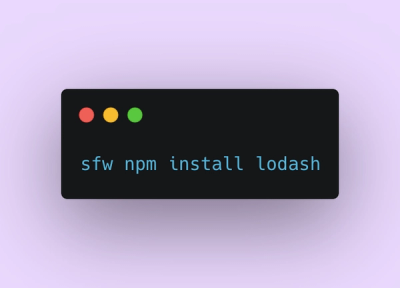
Product
Introducing Socket Firewall: Free, Proactive Protection for Your Software Supply Chain
Socket Firewall is a free tool that blocks malicious packages at install time, giving developers proactive protection against rising supply chain attacks.
cjs-exports-parser
Advanced tools
Parse cjs exports
npm install cjs-exports-parser
import { parseCode } from 'cjs-exports-parser';
const { exports, reexports } = parseCode(`
// named exports detection
module.exports.a = 'a';
(function () {
exports.b = 'b';
})();
Object.defineProperty(exports, 'c', { value: 'c' });
/* exports.d = 'not detected'; */
// reexports detection
if (maybe) module.exports = require('./dep1.js');
if (another) module.exports = require('./dep2.js');
// literal exports assignments
module.exports = { a, b: c, d, 'e': f }
// __esModule detection
Object.defineProperty(module.exports, '__esModule', { value: true })
`);
or
import { parseFile } from 'cjs-exports-parser';
const { exports } = await parseFile('/absolute/path/to/your/file.js');
parseFile does not return reexports, because it automaticlly invokes recurrsively to collect exports.
// DETECTS EXPORTS: a, b
(function (exports) {
exports.a = 'a';
exports['b'] = 'b';
})(exports);
❗️Could not opt-out property in falsy branch:
exports.a = 'a';
exports['b'] = 'b';
if (false) exports.c = 'c';
❗️Could not opt-out exports as param name explicitly:
// DETECTS EXPORTS: a, b, c
(function (exports, Object) {
exports.a = 'a';
exports['b'] = 'b';
if (false) exports.c = 'c';
})(NOT_EXPORTS, NOT_OBJECT);
Could detects exports as function parameter and use another formal variable name:
// DETECTS: a, b
(function (e) {
e.a = 'a';
e['b'] = 'b';
})(exports);
// DETECTS EXPORTS: NO EXPORTS
(function (exports, Object) {
exports.a = 'a';
exports['b'] = 'b';
if (false) exports.c = 'c';
})(NOT_EXPORTS, NOT_OBJECT);
Object.defineProperty are suppored, in this following cases the property will be taken into exports:
if enumerable exists, it must be true in descriptor
contains value or getter;
a. if value exists in descriptor
b. if getter exists, function must return Identifier or MemberExpression or StringLiteral
no other properties exists in descriptor
// DETECTS: a, b, c, d, e, __esModule
Object.defineProperty(exports, 'a', {
enumerable: true,
get: function () {
return q.p;
},
});
Object.defineProperty(exports, 'b', {
enumerable: true,
get: function () {
return q['p'];
},
});
Object.defineProperty(exports, 'c', {
enumerable: true,
get() {
return b;
},
});
Object.defineProperty(exports, 'd', { value: 'd' });
Object.defineProperty(exports, 'e', {
enumerable: true,
get() {
return 'str';
},
});
Object.defineProperty(exports, '__esModule', { value: true });
❗️To avoid matching getters that have side effects, any getter for an export name that does not support the forms above will opt-out of the getter matching:
// DETECTS: NO EXPORTS
Object.defineProperty(exports, 'a', {
get() {
return 'nope';
},
});
if (false) {
Object.defineProperty(module.exports, 'a', {
get() {
return dynamic();
},
});
}
❗️Alternative object definition structures or getter function bodies are not detected:
// DETECTS: NO EXPORTS
Object.defineProperty(exports, 'a', {
enumerable: false,
get() {
return p;
},
});
Object.defineProperty(exports, 'b', {
configurable: true,
get() {
return p;
},
});
Object.defineProperty(exports, 'c', {
get: () => p,
});
Object.defineProperty(exports, 'd', {
enumerable: true,
get: function () {
return dynamic();
},
});
❗️Object.defineProperties is also not supported.
❗️spreads are ignored
// DETECTS EXPORTS: a, b, c
module.exports = {
a,
b: b,
c: c,
...d,
};
// DETECTS EXPORTS: a, b, c
module.exports = {
a,
...d,
b: require('c'),
c: 'c',
};
Any module.exports = require('mod') assignment is detected as a reexport, but only the last one is returned:
// DETECTS REEXPORTS: c
module.exports = require('a');
((module) => (module.exports = require('b')))(NOT_MODULE);
if (false) module.exports = require('c');
// DETECTS REEXPORTS: a, b
module.exports = require('ignored');
module.exports = {
...require('a'),
...require('b'),
};
babel, TS and other bundlers would like to inject reexport helper functions
babel:
// DETECT REEXPORTS: 'external'
'use strict';
exports.__esModule = true;
var _external = require('external');
Object.keys(_external).forEach(function (key) {
if (key === 'default' || key === '__esModule') return;
exports[key] = _external[key];
});
TS:
'use strict';
var __createBinding =
(this && this.__createBinding) ||
(Object.create
? function (o, m, k, k2) {
if (k2 === undefined) k2 = k;
Object.defineProperty(o, k2, {
enumerable: true,
get: function () {
return m[k];
},
});
}
: function (o, m, k, k2) {
if (k2 === undefined) k2 = k;
o[k2] = m[k];
});
var __exportStar =
(this && this.__exportStar) ||
function (m, exports) {
for (var p in m)
if (p !== 'default' && !exports.hasOwnProperty(p))
__createBinding(exports, m, p);
};
Object.defineProperty(exports, '__esModule', { value: true });
__exportStar(require('./foo'), exports);
Normally, the results are more accurate than cjs-module-lexer since cjs-exports-parser do further analysis via babel, but if you do care about performance pretty much, please give cjs-module-lexer a try.
MIT
FAQs
Parse cjs exports
We found that cjs-exports-parser demonstrated a not healthy version release cadence and project activity because the last version was released a year ago. It has 1 open source maintainer collaborating on the project.
Did you know?

Socket for GitHub automatically highlights issues in each pull request and monitors the health of all your open source dependencies. Discover the contents of your packages and block harmful activity before you install or update your dependencies.

Product
Socket Firewall is a free tool that blocks malicious packages at install time, giving developers proactive protection against rising supply chain attacks.

Research
Socket uncovers malicious Rust crates impersonating fast_log to steal Solana and Ethereum wallet keys from source code.

Research
A malicious package uses a QR code as steganography in an innovative technique.